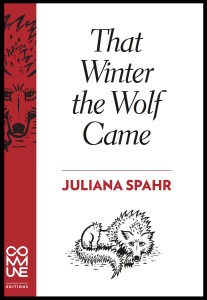
Download it for free here → omniasuntcommunia
Our third release, That Winter the Wolf Came, is written for this era of global struggle. It finds its ferment at the intersection of ecological and economic catastrophe such as the carbon disasters of Deepwater Horizon and the burning Kuwaiti oilfields. And it finds its feminist, ferocious, and finally celebratory energy in the example of the street protests of Oakland, California, and elsewhere.
“Juliana Spahr writes poetry from the 21st century, poised between trying to vault from the flatness of this new world and trying to inhabit it fully.” –The New York Times
“By listing, by naming, the atrocities—the harrowing stats, the scary particulars—in our world-at-endless-war, we might at least exert control over our sanity and extend our mind and compassion to others. It is a connected universe as Spahr so forcefully reminds us.”–Anne Waldman
an excerpt from “It’s All Good, It’s All Fucked”
It’s all good, I would say, it’s all fucked. And then I would breathe. And then, again, it’s all good; it’s all fucked. Again, breathe. And then, it’s all good; it’s all fucked. Breathe again. I might do this while walking. Or while driving in the car. Or while lying down, before taking a nap.
It was Non-Revolution. Or it was me. Or it was Non-Revolution and me. I was unsure what it really was. Maybe it was my thoughts. My thoughts at one minute about Non-Revolution. About the smell of Non-Revolution. Sweat, urine, sage, pot, rotting food, hay, all mixed together. Perhaps about Non-Revolution’s body. I am sure I am not the only one who has thought it exceptional, but I am also just as sure that by the standards of bodies, Non-Revolution’s is fine but not exceptional. That is the point. That is why NonRevolution is called Non-Revolution, why they have revolution as a possibility in their name but it is a modified and thus negated possibility so as to suggest they are possibly neither good nor fucked.
Still something about Non-Revolution’s smell and body had gotten into me. It was thin except when it was not. And not slight except when it was. It had this odd patch of hair on its lower back. Except when it didn’t. And it tasted slightly sour, off. Except when it was sweet, on. At any moment though, to me, it was like something so excellent I could not get enough of it.
About the author
Juliana Spahr edits the book series Chain Links with Jena Osman and the collectively funded Subpress with nineteen other people. With David Buuck she wrote Army of Lovers. She has edited with Stephanie Young A Megaphone: Some Enactments, Some Numbers, and Some Essays about the Continued Usefulness of Crotchless-pants-and-a-machine-gun Feminism (Chain Links, 2011), with Joan Retallack Poetry & Pedagogy: the Challenge of the Contemporary (Palgrave, 2006), and with Claudia Rankine American Women Poets in the 21st Century (Wesleyan U P, 2002).
